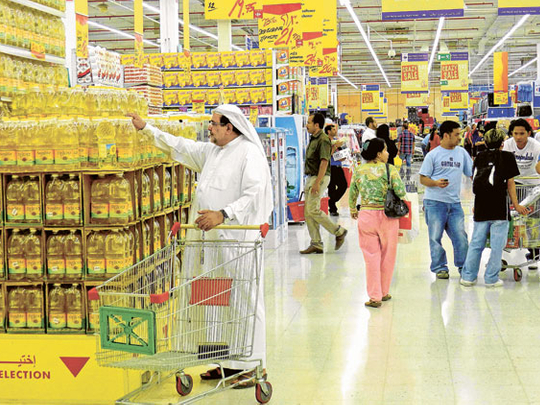
Dubai: UAE retailers have collectively taken a Dh250 million hit to their profits by agreeing to the government's price caps on 1,000 products, a senior official told Gulf News.
Dr. Hashim Al Nuaimi, director of the Consumer Protection Department at the Ministry of Economy (MoE), said over 300 retailers across UAE have agreed to freeze prices of selected commodities and have accepted to bear the costs involved in the effort, which the MoE has estimated at Dh250 million.
His comments came during a tour of the Dubai Cooperative Society at Al Barsha Mall, as part of a series of trips to monitor prices and make sure outlets are abiding by the consumer protection law.
The campaign to freeze prices major commodities was launched by the MoE at different outlets across the country in June and will continue until the end of the year.
Hard to convince
Al Nuaimi said convincing retailers to put a cap on prices of certain products was a hard task.
He added: "We are trying to create a competitive atmosphere among outlets and encourage them to retain prices at the same level even if there are fluctuations in raw material costs locally and globally. "We are committed to strengthening the framework for communication and dialogue with all retail outlets in the UAE."
He added: "Some retailers have agreed to lower prices to the wholesale level, while others will cut prices by up to 50 per cent."
Al Nuaimi told Gulf News that he was very satisfied with the response from retailers and pointed out that the number of stores violating rules this year is very small.
He added that there has been a 20 per cent decline in prices compared to the Ramadan period last year.
Fifty- eight retailers have been fined since the beginning of Ramadan, with most of the violations reported for illegal price increases and manipulations. The fines ranged from Dh5,000 to Dh100,000.
"The Ministry is seeking to extend the process of capping prices to more products," he said.
Major outlets involved
Outlets joining the ministry's initiative include Carrefour, Cooperative Societies, Lulu Hypermarket and Spinneys, which together account for 75 per cent of the retail market share in the country in their segments, Al Nuaimi said.
Prices of staple foods such as rice, flour, meat, tea, bottled water and pasta, as well as household goods such as washing liquid, have been frozen at their current levels.
Jacob Al Beloushi, Manager of Fresh Prodcuts at Union Cooperative Society, said the caps have been placed on prices of 29 products across their outlets, including essential goods like rice, sugar, milk, flour, eggs and chicken.
"This initiative is an ideal model that has had a positive impact on the performance of consumer markets," Al Beloushi said.
It is important to have constant coordination between the ministry, the government, retail outlets and consumers to be prepared for any variable that may affect prices and market stability, Al Beloushi added.











